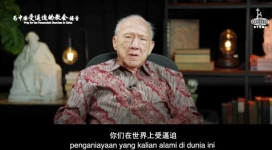
While San Francisco's iconic Golden Gate Bridge has attracted both Bay Area commuters and out-of-town tourists, some people go there to jump off it as a quick way to end their lives. Yale student Luchang Wang has become the latest casualty on Tuesday, dying from an apparent suicide there.
According to June Chang of Eastday, 20-year-old Luchang, a sophomore at Yale's Silliman College in New Haven, Conn., flew to San Francisco on a one-way ticket from the university on Tuesday and jumped off the bridge. The California Highway Patrol ruled her death as an "apparent suicide."
"The California Highway Patrol (CHP) has been in touch with the Yale police and report no evidence of foul play nor any indication of an accident," dean Jonathan Holloway wrote in an email sent to Yale students and faculty Tuesday. "This is a very difficult time for those who knew Luchang, and our thoughts and prayers are with her family and friends. I ask you to focus on one another and offer support at this sad time."
Rachel Siegel and Vivian Wang of Yale Daily News reported that CHP officer Daniel Hill confirmed that the state law enforcement agency received calls regarding a "despondent female" who crossed over the rail of the Golden Gate Bridge and jumped into the San Francisco Bay around 10:29 a.m. Tuesday. Hill added that while the California Coast Guard checked the area, her body has not been recovered so far.
"Our officers were able to locate a piece of property - a backpack - which contained identification that was matching [Wang], but we cannot confirm that the person that jumped was the same person because we don't have the body," Hill said.
According to Chang, the CHP officer did not disclose whether her backpack contained a suicide note or other belongings, other than mentioning that Luchang's photo ID had been found inside.
The death of Luchang has stunned students at Yale. According to Siegel and Wang, an anonymous friend of Luchang stated that the mathematics major was "severely mentally ill" and struggled with issues of mental illness her entire life.
"She was routinely lying to her therapist," the friend said of Luchang. "It was very common for her to express suicidal ideations and then she immediately followed that up, explaining that if we reported her she would be kicked out of Yale and have no reason left not to kill herself."
The anonymous friend added that Luchang was unable to seek appropriate and necessary treatment because of Yale's policies on withdrawal and admission.
"Under Yale's current leave of absence and withdrawal policies, students may elect to take a leave of absence until the 10th day of a new semester," Siegel and Wang wrote. "Students who take leaves of absence may return to campus easily, often simply by emailing their residential college dean."
Siegel and Wang reported that Luchang had already withdrawn from Yale once during her freshman year. Both reporters noted that the process became "far more complicated" after 10 days of absence.
"Students who wish to take time off must withdraw from the University, and they must apply for readmission before they are allowed to return," Siegel and Wang wrote. "Although most students who apply for readmission are accepted, according to the University's policies, readmission is not guaranteed."
Yale's withdrawal and readmission policies may have played a role in her decision, according to Luchang's note, which she wrote on Facebook.
"Dear Yale: I loved being here," she wrote. "I only wish I could've had some time. I needed time to work things out and to wait for new medication to kick in, but I couldn't do it in school, and I couldn't bear the thought of having to leave for a full year, or of leaving and never being readmitted."
However, some Yale students thought that the university's mental health policies leading to her death was a stretch. Tammy Pham told Siegel and Wang that people could have ignored other factors that may have led to Luchang's death; she was among the first to respond to Luchang's Facebook note.
"I can't speak for [Wang], but from our conversations, [difficulty with withdrawal] wasn't the only reason," Pham said. "I don't want her story to become, 'She died because Yale failed her, and if Yale had had a better policy she wouldn't have died.' That's the vibe I've been getting recently, which is very upsetting, because it shows a deep misunderstanding of depression."
Pham added that "there are so many deeper problems at play here, and it's unfair to blame any one institution or person for this" tragedy.
According to Siegel and Wang, Asian American Cultural Center Head Coordinators Hiral Doshi and Jessica Liang have pushed for more awareness surrounding mental illness within the Asian-American community, where it is often stigmatized. Doshi emphasized that it was important to open up a safe environment at Yale, given that some within the Asian-American community are discouraged from sharing their struggles with their own families or others.
"We understand what our community is going through and we don't have the resources to be able to address this issue properly," Doshi said. "We don't want to see anything happen like this ever again."
Siegel and Wang reported a memorial service will be held for Luchang this Saturday at 2 p.m. at Battell Chapel. According to Chang, she is survived by her mother, father and younger sister.







